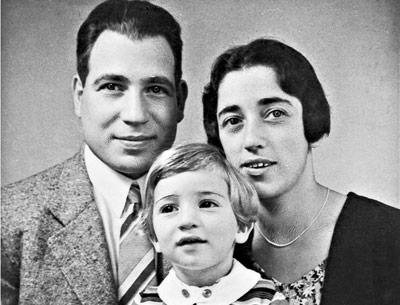Optimist in the Worst of Times

This is not a Holocaust story. So says Marilyn Gottlieb of her new book, “Life With an Accent,” which she’ll talk about at the East Hampton Library on Saturday.
That life belongs to her husband, Frank Levy, who as a 3-year-old in 1936 fled Nazi Germany for Tel Aviv with his parents. Later, when he was 12, with almost no notice, they again left everything behind, down to the beloved family dog, this time for America, his parents’ mix of perspicacity and luck once more keeping the family one step ahead of war and trouble, Palestine at the time being a cauldron of British rule and Arab and Zionist insurgency.
The members of Mr. Levy’s extended family who stayed in Germany died in a concentration camp. That story and the life left behind in the town of Crivitz, near Berlin, make up a significant portion of “Life With an Accent,” but in discussing it, Ms. Gottlieb chooses to emphasize Mr. Levy’s “Immigrant’s Quest to Belong,” in the words of the self-published book’s subtitle.
“There’s such polarization around immigration,” she said Friday over brunch at a bakery in Westhampton Beach (she and her husband live in Quogue). “You never hear good news about it. This is a reminder about how immigrants do good.”
Beyond doing well for himself and his family in the textile machinery business, Mr. Levy, an engineer by training, went on to win an Energy Globe world award for his landfill-sparing, resources-saving work in the recycling of carpets, done in conjunction with an Italian manufacturer.
The book is dominated as much by Mr. Levy’s internationalism as by a sense of the doggedness of the past (return trips to both places where he grew up are recounted). “I’m half from Germany, half from the British Mandate of Palestine, and half from America,” Ms. Gottlieb quotes him as saying. He went from being known as Mucki in Germany to Yaakov in Palestine to Frank in the U.S.
In this country, “Everything was different,” she writes. “Instead of handles, the doors were adorned with round doorknobs. The windows opened up and down instead of outward. Screens prevented flies from entering. There was no sand anywhere. The floors were wood, not stone.” American staples like white bread and peanut butter held zero appeal.
“It’s a tale of adjustment,” she said Friday, “and that’s what makes it interesting to people outside the family.”
It is also instructive on the subject of American isolationism, if not superficiality. In high school in the Bronx, against a backdrop of efforts to establish the new state of Israel, Frank sees the pointlessness of organized sports and the frivolity of preoccupation with movies and popular music.
Assimilation takes time, years, but when it comes, and he starts to think of his home in Larchmont, N.Y., as his “forever place to plant [his] feet,” it brings with it a profound kind of patriotism, in which he recognizes the shortsightedness of sending practically the entire American textile manufacturing industry to China, and still other production to Mexico. “It takes away jobs from our people,” he laments at one point, a capitalist with concern for working stiffs.
“We need to restart manufacturing right here in the U.S.A. We need our young people to become engineers. Maybe if there were fancy award shows for innovative engineering instead of just for acting or singing, young people would gravitate to engineering. Maybe they’d use their creative spark to solve this problem.”
The book was four enlightening years in the making, helped along as Ms. Gottlieb earned an M.F.A. at Stony Brook Southampton after a career as a publicist in advertising. “We’d been married for 22 years and I didn’t know him,” she said.
Her talk, with slides and plenty of time for discussion, starts at 1 p.m. Saturday, and she’ll follow up with another on Nov. 15 at 6 p.m. at Temple Adas Israel in Sag Harbor.
“Everybody’s past matters,” she said. “His life was impacted by outside events that had nothing to do with him.”
The two traveled to Germany together after their marriage, Ms. Gottlieb skeptically, guardedly, her husband relentlessly outgoing and curious, befriending an Aryan German veterinarian from Crivitz and hearing stories of the Nazi years from the point of view of regular citizens and bystanders.
“I always felt that one can’t blame all Germans, especially those who were not old enough to participate in the military during the Hitler era,” Mr. Levy says.
As he puts it more than once in the book on this and other topics, “You have to understand, it’s not so simple.”
